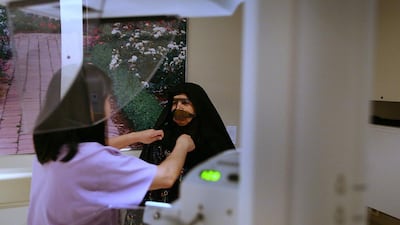UAE doctors are cautiously optimistic over a new medical study that showed promising signs of faster and more reliable diagnoses for breast cancer via artificial intelligence.
A dual project between Google and the UK National Health Service found a ‘deep learning’ system outperformed human medics when evaluating X-rays to search for signs of breast cancer.
Research involved the decision of an AI autobot against human radiologists in a simulation mimicking the diagnosis process.
Results from the research reduced the number of false positive tests, where cancer is incorrectly identified, by almost six per cent while the number of times cancer was missed completely reduced by nine per cent.
“Because of the accuracy of AI, this study suggests this method could be better than a clinical examination and mammogram to detect breast cancer,” said Dr Balaji Balasubramaniam, oncologist at NMC Speciality Hospital in Abu Dhabi.
“However, it is too early to determine exactly how effective this could be.
“People are working around the world to improve the efficacy of current screening methods that are available.
“We will be waiting to hear more final results with a larger population of subjects before we will know if this can be implemented into a healthcare system.”
Under existing NHS screening programmes, where the study was performed, mammograms are analysed by two separate radiologists.
If they disagree with the recommended course of action for the patient, a third clinician will review the decision.
The new AI programme was trained to recognise any signs of cancer taken from mammogram images of more than 29,000 images.
Study findings showed by using AI, there was less chance of medics recording a false positive reducing the need for a third opinion, therefore reducing workload and speeding up patient triage.
Co-author of the paper published in the journal Nature, Lord Darzi of Denham, a professor at Imperial College London, said the techniques could help reduce the workload of busy radiologists in future.
“Screening programmes remain one of the best tools for catching cancer early and improving outcomes for patients but many challenges remain, not least the current volume of images radiologists must review,” he said.
Cancer rates in the UAE have increased by 62 per cent between 2008 and 2017, according to the World Health Organisation.
Although the rise is largely a result of increased screening and better diagnosis, breast cancer remains one of the three most common cancers in the country along with lung and colon cancer.
Around 4,500 new cancer cases are reported every year in the UAE.
“It is a welcome sign to see more research in this area of diagnosis and treatment of breast cancer as this will aim to improve patient outcomes,” said Dr Balasubramaniam.


